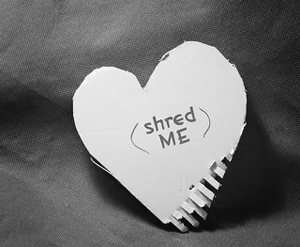Here is a wonderful reflexion of a broken heart man on St-Valentine’s Day. Who said women have the monopole of sadness?
Broken Heart
By Joseph Lestrange
What do you do on Valentine’s day when you have a broken heart?
For me, that’s not the real question because it’s not theoretical and, forgive me, it’s not about you that I’m thinking or anyone else. Let me try again. What do I do on Valentine’s day with a broken heart? Any ideas? What’s the un-version of roses, chocolate, dinner in a beautiful restaurant, holding hands and locking eyes, and making love? Is there an anti-Valentine, an antidote? Any ideas? I have none. The woman I loved and who loved me are no longer together. And it’s worse than that, you see. I still love her and she still loves me. No one left anyone, no one got bored, found another lover, got too busy.
It doesn’t really matter if I explain because it would make no sense, but I’ll say only this: it was about fear and the future and there, please, I’ll stop, close the door gently, ask you not to inquire any more than that. It’s between her and me, but the result is two broken hearts.
And loneliness. No question, Valentine’s Day—like Christmas, the Fourth and Fourteenth of July, and Hallowe’en (at least in the States)—has become a commercial holiday, a swell excuse to sell us candy and flowers and manufactured romance peddled to us in mass-produced greeting cards and prix-fixe dinners with candles and, if you can bear it, violins. No one should need a day, or an excuse, to tell his lover how much he loves her, to give her flowers or anything else she might love to have, to be in love and show it. But the day has also become an emblem, a day not to be without a lover, not to be alone, sad, disappointed. Any day is a good one, rain or shine, to walk down the street les yeux dans les yeux et la main dans la main, but it stings a lot more on Valentine’s Day not to do it, not to be one of those “amoureux des bancs publics” that the subversive Brassens used to sing about, not caring in the least if the whole world watched them make out on a bench in le Luco or le Parc Monceau or perched on the homely fountain in la Place de la Réunion or the jungle gym in le Square Maurice Gardette. Any time, any place, anywhere.
But what to do when “forever” turns out to be a matter of months, of a certain number of days together, of certain other numbers of e-mails, of dinners, of visits to museums and stores and friends, of trips to the airport before and after travel? Forever was not supposed to be finite, let alone brief. But you know this too, don’t you? Maybe the tragedy is that it’s not really tragic, but a commonplace of life and love—as universal and as well understood as cutting your finger in the kitchen while chopping up chicken and carrots or just missing the bus you had run for. I know that too, you see, but do you think it makes it hurt any the less? Dulls the pain?
The anesthesia of alcohol made sense for a couple of weeks. The pain did get slightly dulled, sleep was dreamless, the numbing of eau de vie and wine matched up neatly with the numbness of heart and thought. But it did not take her out of my thoughts, couldn’t. Time will do it, she said, they said, I said too, and time has helped, but is still not my friend. Because every tick of time has moved her farther and farther away from me, and I did not want distance, do not even now—not at all. But time is less harmful than alcohol and maybe they lead me to the same place anyway, which is not where I want to be—not at all. Do I want my senses dulled? The blunting instrument, time or booze, makes no difference if I want to answer the question, and I’m split down the middle. I don’t want to hurt as much as I have been hurting, but I don’t want to say it’s over, nevermore, adieu. Blunting the hurt, you see, blunts the love. But love should be sharp, have a cutting edge without drawing blood.
Nor should loss of love… no, nor should the loss of my lover make me sour when I see lovers smiling at each other, kissing, happy to be just the two of them in the middle of the swarming fauna of the city that may watch or ignore them. Why be a killjoy… though I wish they’d get a room. Anyway, I know that perhaps fifty percent of them are heading for the same ditch I’m sitting in now. But that doesn’t make me happy. If only. If only some failure on their part or some miraculous arrow of the anti-Cupid would let me expropriate their happiness for my own use, recalculate the zero-sum of love. But it doesn’t work that way, and why wish them harm or ill?
Or maybe, I’m supposed to hope, hope for… what? The best, of course, whatever that is—and at the moment I can’t tell what that might be, so I’m not hoping, not letting myself hope. I have bets with a couple of hopeful friends who are sure that she will not be able not to be with me, that she will say Let’s start over or One more time, phrases we used to use in another, better context. If I win, I will be out a couple of expensive meals, but it’s a bet I’d be very glad to lose and throw in brunch as well.
So what do I do today? And, harder to think about, what do I do tomorrow?

